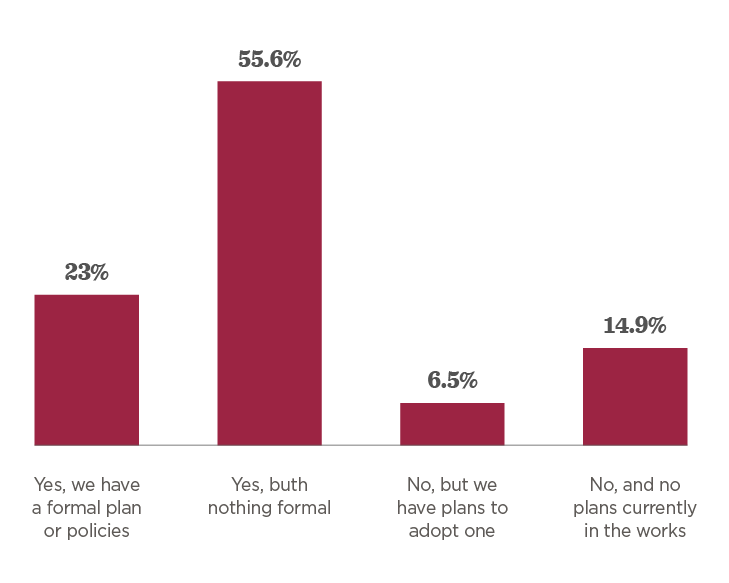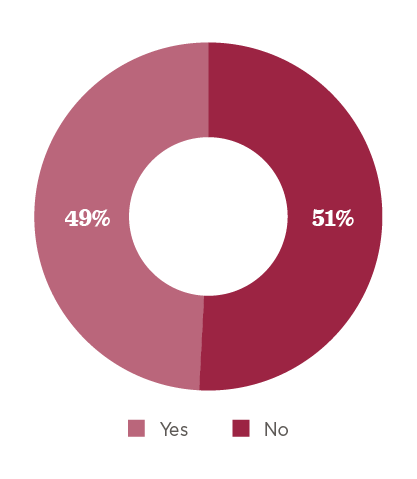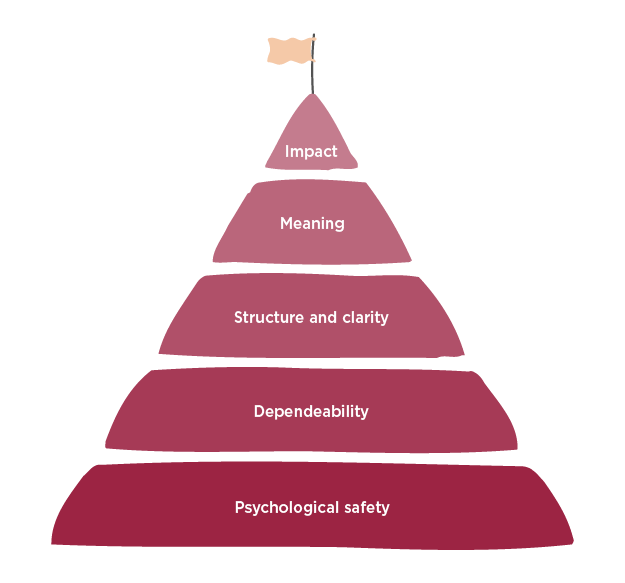Introduction
In 2019 the US employed 11.8 million tech workers, with 261,000 jobs added that year alone. With an industry cash value estimated at $1.8 trillion, tech is trending upwards. This industry growth is occurring in tandem with shifting cultural norms.
A 2019 CompTIA survey showed that 64% of respondents agree that “An organization with a heterogeneous employee base is more likely to produce world-class innovation than one with that is largely homogeneous in makeup.” While minorities have been traditionally underrepresented in tech, there is a push for diversity and inclusion (D&I).
There is a strong correlation between workplace diversity and inclusion and improved business performance, propelling the implementation of D&I programs. As companies scale, however, growing pains are inevitable. In order to stay agile and adapt, organizations are increasingly implementing strategies encouraging D&I.
For example, the First Round State of Startups 2019 survey reveals that a majority of startup companies informally promote diversity and inclusion. To remain competitive, today’s business leaders and HR professionals must build a workplace culture that is positive, collaborative, inclusive, rewarding, and infused with culture-forward values.
Let’s discuss the pillars of cultural safety:
- What cultural safety means
- Existing laws protecting cultural safety
- How to go beyond legal standards
- HR’s role in defining organizational cultural safety
- Long-term strategies for protecting cultural safety
Cultural safety by the numbers
Does your organization have a strategy to promote diversity and inclusion?

Have you or has someone you know personally experienced sexual harassment in the workplace?

What is cultural safety?
The concept of cultural safety emerged in New Zealand during the 1980s as a framework for responding to unequal access to health services by indigenous Maori people. As defined by indigenous rights leaders at the time, culturally safe practices recognize and respect the identities of others and meet their needs, rights, and expectations. Contrarily, culturally unsafe practices diminish, demean, or disempower the cultural identity of an individual.
“Cultural safety is an environment that is spiritually, socially, and emotionally safe, as well as physically safe for people; where there is no assault challenge or denial of their identity, of who they are and what they need. It is about shared respect, shared meaning, shared knowledge, and experience of learning together.” Robyn Williams, 1999, Lecturer in Indigenous Health, FATSIS, NTU.
While the notion of cultural safety arose as a response to health care inequalities, it is instructive in a much larger context. For organizations, fostering cultural safety in the modern workplace involves recognizing the unique and diverse identities of their employees and developing safeguards and processes to protect the expression of these identities. In this sense, cultural safety requires ensuring that employees are secure and given the ability to flourish, regardless of race, religion, gender, physical or intellectual differences, or sexuality. There are two main components of cultural safety in the modern workplace: psychological safety and physical safety.
1. Psychological safety
According to the WHO, depression and anxiety cost the global economy an estimated $1 trillion in lost productivity every year, making responsiveness to mental health challenges an integral part of cultural safety in the workplace. Harvard Business School Professor Amy Edmondson coined the term “psychological safety,” defined as “a shared belief that the team is safe for interpersonal risk-taking.” For organizations to succeed, employees need to feel respected and accepted. Only under these cultural conditions can team members from diverse backgrounds take risks and contribute to growth in a meaningful way.
Understanding psychological safety in the workplace can be best understood by examining cases where this culture was absent. Wells Fargo’s aggressive cross-selling tactics, for example, led to business failure as employees lost trust in the company and failed to meet targets. While for some companies, failure to promote psychological safety led to collapse, for others these failures were instructive. Uber is one company that has undergone transformation from a dysfunctional culture to one centered on truth-telling and inclusion.
Company cultures where individuals feel psychologically unsafe are those where employees refrain from contributing their opinions for fear of reprisal or rejection, questions aren’t posed, and innovative ideas are not offered for fear of criticism. Without efficient and open communication, teamwork and creativity are stifled, leading to stagnation and poor employee retention.

2. Physical safety
It should be self-evident that employees that feel unsafe at work will not be able to perform to the best of their abilities and will be more likely to seek employment elsewhere. Physical safety entails providing safe and hazard-free working conditions and creating an environment that is comfortable and appropriate for employees. Keeping the workspace well ventilated, adequately lit, noise-controlled, and ergonomically designed will protect employee’s health and signal a culture of care. According to OSHA, employers with safety and health programs will benefit in a number of ways, such as preventing injury, improving company compliance with safety regulations, reducing costs, and increasing productivity. Promoting physical safety in the workplace will also promote greater employee engagement and position the organization as an advocate for social responsibility.
Physical safety goes beyond the work environment to preventing and responding appropriately to violence in the workplace. The Canadian Centre for Occupational Health and Safety defines what might constitute violence, stating that:
“Rumors, swearing, verbal abuse, pranks, arguments, property damage, vandalism, sabotage, pushing, theft, physical assaults, psychological trauma, anger-related incidents, rape, arson, and murder are all examples of workplace violence.”
Establishing a zero-tolerance policy toward workplace violence and implementing a workplace violence prevention program will help ensure that all employees know that any claims of workplace violence will be remedied quickly and appropriately. Failing to implement physical safety protocol can have an adverse effect on a company’s long term success.
A nationwide poll conducted by the Society of Human Resource Management (SHRM) in 2019 revealed that one out of seven respondents does not feel safe at work. One in four respondents report at least one incident of workplace violence at their current place of employment. When employees feel unsafe, for any reason, this will contribute to higher turnover, low trust, and productivity will likely suffer.

Why is cultural safety relevant to today’s HR leaders?
With the expansion and globalization of the tech industry, society is undergoing a period of introspection and breaking down barriers that prevent cultural understanding and support. According to the 2019 Edelman Trust Barometer, people are looking to their employers to implement positive changes and respond to inequality, discrimination, and harassment.
“Restoring people’s faith in the system and its institutions is one of the greatest moral imperatives of our time. This faith will be rebuilt one step at a time starting within the trusting context of the employer-employee relationship and moving outward from there.”
Investing in workplace safety can significantly reduce the costs of workplace injury and other cases of misconduct, saving on workers’ compensation, medical expenses, costs to replace and train new employees, and conduct investigations. Safety investments also boost employee morale and job satisfaction, encouraging retention, engagement, and productivity.
HR leaders have the tools to implement processes and protocols that protect the psychological and physical safety of employees, in partnership with other stakeholders, playing a vital role in promoting cultural safety.
Existing legal standards
American employees benefit from legal protections aimed at providing basic safeguards from harm in the workplace. While there are regulations in place, these provide limited coverage and do not replace an organization’s individual commitment to promoting cultural safety.

1. Physical safety regulation
In the U.S., the Department of Labor enforces over 180 worker protection laws governing health, workplace compensation, and union regulations. OSHA, as part of the Department of Labor, is tasked with developing and enforcing regulations and standards concerning physical safety in the workplace, including fall protection, respiration protection, and hazard communication. According to federal law, every American worker is entitled to a safe work environment, and any employee that feels that this right has been violated may file a claim. Of course, speaking out against an employer can be intimidating and many employees may fear retaliation. This is why OSHA also provides whistleblower protections for specific claims.
2. Psychological safety regulation
The Equal Employment Opportunity Commission (EEO) enforces federal laws regarding discrimination or harassment against job applicants and employees in the U.S. EEO outlines categories of discrimination that fall under their jurisdiction: age, disability, genetic information, national origin, pregnancy, race/color, religion, and gender. In addition to developing protections from discrimination, EEO is also responsible for ensuring equal compensation; preventing and responding to harassment, including sexual harassment, and protection from retaliation for individuals filing claims. These protections, however, don’t include companies with fewer than 15 employees
Going beyond legal standards
While adhering to rules and regulations, such as those enforced by OSHA and EEOC, is important, these standards aren’t sufficient. Beyond basic protections from hazards, harassment, and discrimination, company leaders are responsible not only for people’s physical safety but also for creating a work environment where employees feel protected and appreciated. Cultural safety must be embedded in a company’s fabric to ensure optimal working conditions and this means going beyond basic legal standards.
Prevention
Organizations must take the initiative to prevent incidents before they occur. Clearly articulating, communicating, and enforcing your cultural safety standards signals to your people that they can bring their whole selves to work without fear of reprisal or discrimination. Taking active steps to prevent incidents before they occur isn’t just the right thing to do, it is also the smart thing to do. When workplace harassment does occur, the costs are steep and can cost an organization far more than money.
There were just under 73,000 claims filed with EEOC in 2019 with settlements for that year costing employers over $346 million. In addition to the legal fees, fines, and settlements, companies with claims against them will likely suffer far greater losses:
- Higher insurance premiums
- Damage to company reputation may repel clients
- High employee turnover rates and fewer quality applicants
- Lower employee engagement and productivity
- Lost time to conflict resolution and legal proceedings
Creating a culturally safe environment requires the involvement of all stakeholders, including HR, managers, and staff, and consistent, frequent messaging about the shared values of your organization. From the hiring process onward, every member of the company should be aware of cultural safety and actively contribute to keeping the workplace safe and welcoming. One way to prevent incidents and signal your organization’s commitment to diversity and inclusion is to create a comprehensive, collaborative company code of conduct.
Creating a code of conduct
While no federal or state laws specify the need for one, creating a code of conduct and communicating it effectively is one of the main ways to foster cultural safety in the workplace. According to ECI, a code of conduct:
- Clarifies an organization’s mission, values, and principles • Serves as a benchmark against which individual and organizational performance can be measured.
- Acts as a central guide and reference for employees. Here are 10 ways for organizations to foster cultural safety and incidents before they happen with a comprehensive code of conduct:
- Plan regular meetings to communicate policies include training sessions, personnel meetings, office meetings, and group discussions.
- Develop the code of conduct with employees from across all levels of the organization, and even possibly with an external consultant if budget allows. The collaboration will enhance compliance by creating a sense of shared responsibility and ownership over company culture.
- Clearly communicate the code of conduct and all policies to employees and managers, including potential disciplinary actions. Include the code of conduct in:
- Hiring documentation
- Onboarding training
- Print posters for maximum visibility
- Internal newsletters
- Manager training
- Online employee quizzes or surveys
4. Ensure that managers and supervisors understand their responsibility to provide a culturally safe work environment, including instituting an open-door policy for any staff seeking to report an incident. Employees should be encouraged to approach managers with any concerns or complaints, with the company’s open-door policy outlined clearly in the employee handbook. The onus is on managers to make themselves available to employees. When a complaint is being made, failure to address the issue swiftly and transparently can negatively affect employee morale, making it essential to maintain open communication.
5. Ensure that all employees understand the policy and procedures surrounding dealing with harassment, ethics violations, and other incidents that make them feel unsafe. These should be included in the employee handbook and code of conduct, communicated during employee and manager training, and available in channels such as surveys or internal newsletters.
6. Codes of conduct must apply to everyone equally, including managers and supervisors. Consider having all personnel sign their commitment to upholding the code of conduct.
7. Codes of conduct must apply to everyone equally, including managers and supervisors. Consider having all personnel sign their commitment to upholding the code of conduct and instituting more advanced codes of conduct for people higher up on the office hierarchy.
8. Promptly handle all reports or complaints of harassment or inappropriate speech/behavior:
- Listen to the employee for as long as they need it. Ask relevant questions and make sure the employee knows that you take their concerns seriously.
- Discuss the issue with the employee’s immediate supervisor.
- Prepare a formal complaint form for review by HR investigator, higher-level management, or other relevant stakeholders.
- Communicate information on a need-to-know basis to protect employee privacy.
- Hear from the person the complaint was lodged against by calling a hearing.
- Determine what corrective action will be taken. This can be a warning, suspension, or termination depending on the magnitude of the incident.
- Keep the complainant in the loop and provide counseling if needed.
9. Make sure your company’s anti-retaliation policy is upheld. Beyond protecting employees from retaliation, it will provide support to any individual reporting an infringement or your company’s code of conduct.
10. Be clear about microaggressions. Discrimination and sexism often manifest in subtle ways so take steps to eliminate these less obvious but more insidious harms. Social media, inappropriate jokes, inflammatory political discussions, and discriminatory interactions in informal settings can impact the cultural values of an organization.
It can be difficult to articulate what constitutes a microaggression. One way to navigate this ambiguity is to regularly initiate sensitivity training exercises for employees and managers. Giving employees the opportunity to speak openly about microaggression is another way to clarify your organization’s code of conduct—open communication will create an environment where employees feel safe and respected.
11. Monitor and revise policies and programs on a regular basis to ensure that it is still effective for your workplace. This includes having employees sign off on the code of conduct, having legal review and approval of all cultural policies, and updating documentation regularly.
Creating a code of conduct and employee handbook
Creating a single source of truth for a company’s code of conduct is vital to communicating an organization’s culture and ensuring compliance. However there is a lot more to say about cultural safety. Employee handbooks are an opportunity to go deeper into your company’s values, identify risk areas, and address important matters such as:
- Physical and mental health and safety
- Equal employment opportunity
- Workplace violence
- Harassment, sexual or otherwise
- Freedom of speech, opinion, and association
- Disciplinary policies
- Ethics
- Integrity
- Confidentiality
While the employee handbook will include a concise code of conduct, it will also include more information and resources to empower employees and protect the integrity of the organization. Some of the benefits of developing a comprehensive employee handbook include:
- A forum to provide mandatory information in writing: for example, equal employment opportunity (EEO) statements.
- A legally-compliant employee handbook may protect your company if its policies are ever challenged in court.
- Clearly-defined grievance procedures will highlight the ease of reporting and encourage conflicted employees to file their complaints. Employees must feel protected from retaliation when making a claim or once they have testified as a witness in a case.
- A well-crafted handbook will address routine inquiries that are normally directed towards HR, saving your company’s HR time and resources.
Having a cultural safety policy in place does not mean that there will be no complaints. However, implementing an effective policy and procedures, providing training for all staff, and communicating policies will assist in preventing incidents and support individuals to come forward and ensure that the problem is addressed. In the United States, courts have held that an employer who responds quickly and effectively to a complaint by taking steps to remedy the situation and prevent future harassment will not be liable to the same extent, if at all, as an employer who fails to adopt such steps.
Cultural safety and hiring practices
One way to ensure that employees, managers, and other team members will comply with and contribute to company cultural values is by hiring individuals who align with them. Start from the beginning with strategic hiring for cultural fit. This can reduce turnover, prevent incidents and complaints, and improve productivity, for both ethical and practical benefits. In one study, 84% of recruiters surveyed regarded cultural fit as one of the most important factors in hiring.
Culture fit refers to how an employee engages with the values, norms, language, and accepted behaviors of an organization—specifically as it relates to diversity and inclusion. When employees “fit” within the company’s culture, this alignment contributes to greater cohesion and collaboration. Research from McKinsey has demonstrated that a culture of diversity and inclusion contributes to increased sales, share prices, and profit. Gender and ethnic diversity, anti-harassment policies, and other factors are proven to enhance productivity, making hiring for cultural fit an integral part of promoting cultural safety in the workplace.
Prior to initiating a hiring process, a culture fit checklist should be developed. Some things to look out for are:
- Shared enthusiasm about your company’s commitment to cultural safety
- An understanding of your organization’s approach to working together
- Compatibility with other team members in terms of working culture, including risk assessment and decision making
- Enthusiasm for diversity and inclusion efforts
- Awareness of privilege and representation in the workplace
- Cultural qualities or cultural deal breakers identified in potential hires
- Verify culture fit and first impressions via references and background checks

It is important to remember that cultural fit doesn’t mean homogeneity. Finding more people who are the same is the opposite of diversity and inclusion and constitutes a form of discrimination. Focus on cultural values, not on individual characteristics such as race, education, or age, when hiring for a culture fit.
Fixing an existing problem
It is one thing to build cultural safety into a company’s identity from the outset and another to repair an existing problem. Safety, diversity, and inclusion must permeate training and evaluation at every level of management, thereby creating a trickle-down effect. Furthermore, cultural safety training should be provided throughout the employee lifecycle for every employee, without exception.
Cultural safety requires continuous focus, assessment, and ongoing dialogue. For example, having mandatory quarterly or biannual onsite training will help employees at all levels of the organization stay aligned and create opportunities for team members to report incidents and air grievances in a safe environment.
When tackling cultural safety issues:
- Refer to your policies—this is when a comprehensive and communicated code of conduct or employee cultural safety handbook will provide guidance
- Address issues quickly, effectively, and transparently
- Take every employee complaint seriously regardless of perceived magnitude
- Seek legal advice from in house counsel and follow their recommendations
- Address any incidents that compromise cultural safety openly and reiterate the company’s zero-tolerance policies to your people
- Honesty is the best policy. Don’t let rumors ruin your company’s culture by communicating transparently with stakeholders
A toxic work environment evolves over time, and the best way to tackle it is through early intervention. Research indicates that toxic workplaces consist of “bad” leaders and colluders who share the leader’s bad values, or conformers who are too intimidated to complain. Quickly identifying toxic culture and stopping it before it spreads will protect cultural safety and even enhance it by demonstrating that your company stands by its values even in difficult situations.
Safe reporting
Workplaces must have clearly defined policies and consequences for situations of workplace harassment or misconduct, but if people don’t feel safe enough to report incidents, then these measures won’t hold water. In 2019, over half of the charges alleging workplace discrimination listed retaliation as the cause.
Retaliation describes an employee being targeted for dismissal, demotion, or harassment after filing a discrimination complaint or otherwise opposing discrimination. Retaliation against individuals who oppose discrimination will undermine the cultural safety of your organization and will prevent other employees from calling out offenders. It will also increase the risk of litigation, making it absolutely vital to create safe reporting procedures and anti-retaliation policies.

Three-quarters of sexual harassment charges filed with EEOC include a charge of retaliation, indicating that many organizations do not protect complainants. Furthermore, the rising number of EEOC complaints is a testimony to the lack of faith employees have in their companies to handle incidents internally. This may be out of fear of retaliation, or perhaps a belief that complaints will fall on deaf ears.
To streamline reporting and ease the burden on the victim, the HR tech market has introduced various solutions to promote easy reporting. Companies are instituting easy-to-navigate internal reporting processes that are accessible and comfortable for employees, in order to encourage prompt handling of incidents in-house.
HR leaders going beyond legal standards
Unlike physical threats to the workforce, other intangible threats fall into a grey area, where legal stipulations cannot be relied upon to protect employees. There is no magic solution for preventing harassment and misconduct, but defining clear rules of engagement reassures employees that their concerns will be addressed.
Being the gatekeeper of company culture, HR leaders together with company executives must exhibit zero tolerance for unethical behavior and take a proactive role in implementing cultural safety protections.
Given the far-reaching implications of toxicity to a company’s cultural safety, HR should work together with managers to ensure that the following checks and controls are in place:
Open-door policy
HR managers should maintain an open-door policy, inviting all personnel to share views and voice concerns. One of the main ways to signal an open door policy is to develop protections from retaliation for employees reporting incidents, including tech-enabled reporting mechanisms.
Ongoing communication
Processes such as performance reviews and one-on-one interviews are a natural place for red flags to emerge. HR should develop a cultural safety checklist to use during such meetings to help identify potential issues before they become more problematic.
Job descriptions
While hiring for cultural fit can contribute to the overall culture of an organization, it is important to remember that fit doesn’t mean homogeneous hiring. Ensure that the phrasing of your job ad is gender-neutral and free of intimidating jargon, and states your company’s commitment to diversity and inclusion. If you offer great parental leave policies or comprehensive health coverage, this is another thing to mention.
Get input on job descriptions from the people who understand the role best—other employees and direct managers. Their advice can help ensure that job description are clear and accurate to attract the best possible candidate.
Aligning management
Clarify management’s expectations for employees on a regular basis and ensure that they are not unreasonable and that policies aggressively focus solely on financial numbers. Overly-demanding and competitive cultures can turn even top performers into toxic employees.
Equal application of policies
Every employee, regardless of stature or title, must adhere to the company’s code of conduct as defined in the code of conduct and employee handbook. In order to preserve a safe culture, any individual exhibiting consistently toxic behavior must be let go. This can be a complicated process, so make sure you follow legal procedures and consult with in house counsel before taking any steps.
You will need a valid business reason to terminate an employee so make sure any incidents are documented. These may be brought up in a performance review and the employee may be given the opportunity to change their behavior. In some cases, however, the severity of the incident may be grounds for immediate termination. Bring the individual in for review, including managers, supervisors, and any other necessary parties, and explain clearly the reasons for dismissal.
Setting the language
Define preferred modes of company communication, both for official announcements and employee communications, setting guidelines, and red lines. Workplace civility and violence prevention training promotes respect and cultural safety in the workplace. Minimizing the occurrence of incidents such as bullying, shaming, or other toxic behavior can only be achieved with vigilance and continued training.
Reporting mechanisms
Employee safety reporting processes are integral to maintaining cultural safety. Create an easy reporting process for your people and develop anti-retaliation guidelines to protect whistleblowers and victims.
Consider these ten mechanisms to protect complainants and handle complaints effectively:
- Offer a 24/7 hotline or digital solution to file a complaint/grievance immediately
- Guarantee confidentiality
- Meet with complainants swiftly to collect details, perhaps off-site or after hours
- Remain objective and an active listener
- Select an impartial investigator or panel as needed
- Determine consequences for the perpetrator in accordance with company policy and legal consultation
- Follow up and monitor resolution
- Be transparent with your people and emphasize zero tolerance, but protect the identity of the complainant if this is their preference
- Help survivors, including offering compassionate leave or mental health services as needed
- Reassess your organization’s policies based on emerging complaints and resolved issues
Bystander intervention
Develop bystander intervention training to empower coworkers and give them the tools to recognize, intervene, and show empathy when they witness inappropriate or harassing behavior. Studies have shown that bystander training can be more effective than standard anti-harassment training by placing responsibility equally on all team members rather than the onus being squarely on the victim.
HR leaders have the tools to promote cultural safety in the workplace and implement policies to protect and empower employees. This will contribute not only to employee satisfaction and productivity, but will also enhance your brand reputation and position you as an ethical market leader.
Strategies for long-term cultural safety
Cultural safety is an ongoing process. Keeping agile and realigning your organization according to a shifting landscape will keep you ahead of potential issues and reduce the risk of toxicity, complaints, legal proceedings, and high employee turnover rates.
Here are five strategies to promote a culturally-safe workplace into the future:
- Gain the support of management
- Inspire diversity
- Support authenticity
- Promote candor
- Holistic approach to cultural safety

1. Gain the support of management
Contemporary HR teams should urge business leaders to be flexible and let go of cultures and policies that do not serve the present-day values of the company. For example, when management creates an overly competitive and aggressive environment, this can lead to bullying, intimidated and unhappy employees, and diminished productivity.

2. Inspire diversity
Promote a “fearless organization” with a culture of learning and transparency instead of a culture of compliance. Creating spaces for ןndividual expression implementing fair employment practices, participative leadership, management support for diversity, and open communication will inspire loyalty and productivity. Ensuring that fear and intimidation do not control employee behavior will improve retention and attract top talent, further cementing your organization’s long term success.

3. Support authenticity
A culturally-sensitive, forward-thinking workplace will encourage its people to show their true colors, instead of pressuring them to conform. Downplaying individual differences by covering up appearance, affiliation, interests, and association will decrease employee self-confidence and hamper productivity, ultimately impacting employee engagement and stalling the company’s efforts to foster a culturally safe environment.

4. Promote candor
Open and honest discussion is the foundation for wellbeing in the workplace and HR professionals must encourage dialogue and the honest exchange of ideas for long term cultural safety to take root. While guidelines on engagement are important to maintain civility, companies that encourage their people to speak their truth will benefit from employees that feel psychologically safe and therefore more committed to promoting organizational goals.

Recommended For Further Reading
5. Holistic approach to cultural safety
To empower employees to do their best work, HR, in cooperation with business leaders, must prioritize creating a bias-free workplace. Preventative measures to avoid health and safety issues on the job will provide a strong cultural basis when problems do occur and policies for recourse will likewise let employees feel safe at work. Involving employees in cultural safety initiatives will foster a spirit of open communication and instill a sense of shared responsibility in promoting a culturally safe workplace.
The role of technology in creating culturally safe environments
Today’s emerging tech platforms offer a wealth of solutions to the ever-growing list of HR’s challenging tasks. Scaling companies can benefit from the power of technology, using tools to help communicate and prioritize safety standards. Social platforms give employees a voice, maintain transparency, and promote cultural safety.
The European Union recently the Whistleblower Directive, mandating companies with more than 50 employees or 10 million Euros in annual turnover to implementing anonymous reporting channels for employees who experience or witness inappropriate or unethical behavior. These platforms allow employees to report negative experiences with minimal fear of retaliation, encouraging honesty and transparency.

bob’s Your Voice is a unique service that empowers people to anonymously report workplace misconduct without fear of retribution and enables companies to take swift action. Your Voice complies with the EU Whistleblower Directive and helps to increase cultural safety, encourage secure reporting, and provide a single source of truth for organizational policies.
